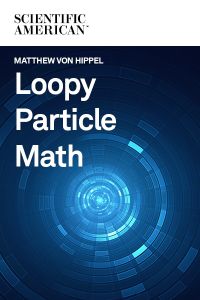
Loopy Particle Math
Scientists are creating mathematical tools to identify novel particles and phenomena at the world’s largest particle accelerator
Recommendation
In particle physics, it can be all too easy to focus on the hardware. With ever bigger and more expensive accelerators and colliders, the headlines are grabbed by machines and engineers. The fantastic power of the mind is sometimes devalued by charismatic individuals’ brilliance. However, frequently the mental gymnastics needed to calculate even seemingly simple assertions is not appreciated. Matthew Von Hippel’s enthusiastic peek into the work of mathematicians and physicists known as “amplitudeologists” is a refreshing celebration of the miracle of thought and reasoning.
Summary
About the Author
Matthew von Hippel is a postdoctoral scholar at the Niels Bohr International Academy in Copenhagen. He has been working on amplitudes since he stumbled into his adviser’s office in graduate school, looking for a summer project. He has also been doing science outreach since he got into a discussion with Ars Technica’s science editor about the definition of “theory.”








Comment on this summary